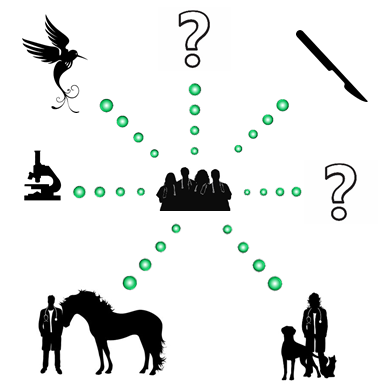Core & Specific Content
We understand the development of competence in learners as a progression from the novice to the proficient practitioner. As an accredited college of veterinary medicine, it is our responsibility to ensure that all students develop competence in key, integrated skills that transfer across species and disciplines. These skills and their associated knowledge will be known as the “core” content. Additionally, we will provide paths to proficiency beyond basic competence in skills and knowledge pertinent to specific areas of interest or employment. These will be known as the “specific” content that may define focus areas or represent additional opportunities within the curriculum.
Competence in veterinary medicine is defined by the standards set forth by the American Veterinary Medical Association (AVMA) Council on Education and clarified by American Association of Veterinary Medical Colleges (AAVMC) Competency-Based Veterinary Education (CBVE) framework. Additionally, graduate licensure is contingent on passage of professional benchmarks, notably the North American Veterinary Licensing Examination (NAVLE). These resources and the comprehensive view of the profession that they represent act as our organizational starting point for defining required skills and associated knowledge. We must consider the evolving needs of the profession as well – through strong communication with content experts, practicing professionals, and other external stakeholders.
 Core Content
Core Content
Core content is informed by external benchmarks of professional competence in veterinary medicine, including the NAVLE practice analysis, competencies, and diagnosis list, the AAVMC CBVE framework, and the corresponding list of Entrustable Professional Activities (EPAs)
Additionally, core competence and content should be informed by input from both generalists and specialist content experts.
All students will be expected to become competent in core content, as these topics and skills are integral to developing competence in a wide array of common veterinary tasks. Students who have completed their core content will have a base of generalist skills and knowledge from which to explore topics of particular interest in greater depth via specific content studies.
Specific Content 
Content that is not considered to be core but is important to particular areas of practice should be informed by employer expectations, expectations from professional groups where available, and input from specialist content experts.
Specific content expands upon understanding and skills gained from the study of core content to go into greater depth on targeted subjects.
Each student will be expected to develop proficiency in specific content related to their focus area and/or professional plans.
Core & Specific in the Curriculum
During Stage 2, the Planning Committee will have many options for implementation of Core and Specific content. As a recommendation from the Steering Committee, the final structure may be roughly organized as:
Years 1-2 Core
- Focus on learning core content
- Teach skills and knowledge fundamentals from the first semester onward and interconnect both conceptually and directly through activities and assessments
- Stress transferability of content within and between current, previous, and future courses (vertical and horizontal)
- Establish dispositional expectations with direct instruction and modeling
Years 3-4 Specific
- Transition into specific skills and knowledge
- Push for proficiency in specific areas and demonstrated competence in core areas
- Include development of core skills that require extensive synthesis of previous learning
- Stress consistent demonstration of professional dispositions
Discussion Point: Where does Core end, and Specific begin?
Many discussions will be had with course coordinators and topic experts as part of determining what content we consider “Core” and what is “Specific”. This is will be a college-level discussion through Fall and Spring semesters of the 2019-2020 school year and a major element of the Stage 2 process.
